VARIOUS ARTISTS / “Zimbabwe Mbira Music”
In Zim they say: women are mothers, men are children. Zim is Zimbabwe and if you only listened to the minute or so of international news that might mention Zim, you would probably only know of Zim as a basket case, another example of Africa’s inability to rule itself.
Mugabe would be a poster-elder for corruption, ineptitude, vanity, and would also be living proof that Africans are incapable of self-rule. That’s what you would know from the news, if you were the average American viewer and only knew what you got through the mainstream media.
How many of us remember, or ever knew, that Zim is the same country used to be called Rhodesia when British colonialism was in charge. I can hear a few readers moaning: oh, he’s going to go into an anti-colonialism screed; I thought this was a music website.
“Kalamu, why don’t you just write about the music and ease off with the politics?”
Did you know that the British had banned the mbira? That’s a big jolly roger. This week we are focusing on three Zim women musicians for whom the mbira is integral to their music.
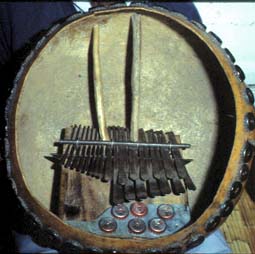
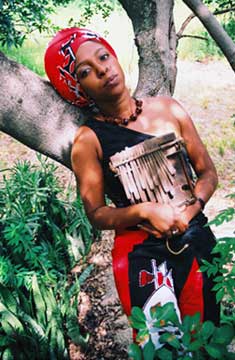 Chiwoniso was born in exile in 1976 to Zimbabwe parents. Her father Dumisani Maraire is both a professional musician and a professor of music. Chiwonsio started at a very early age, probably singing before she could fully talk, and dancing before she mastered walking.
Chiwoniso was born in exile in 1976 to Zimbabwe parents. Her father Dumisani Maraire is both a professional musician and a professor of music. Chiwonsio started at a very early age, probably singing before she could fully talk, and dancing before she mastered walking.
"I was born into a very musical family, both my parents were musicians. My father was an amazing mbira player, my mother was a beautiful singer, so I was surrounded by this music from the day I was conceived, really, because they used to teach classes in the house as well. But at the same time they loved to listen to other people, so I grew up exposed to James Brown, Michael Jackson, Roberta Flack, Aretha Franklin, The Rolling Stones, Bach, Mozart, you name it, it was being played." —ChiwonisoChiwoniso attended high school in Zim when the family returned home in 1990, where she led a local choir. Deciding to pursue music seemed almost a given but Chiwonsio had no guarantee of success, nor was it clear what musical path she wanted to explore. She was a member of a hip hop oriented ensemble, A Peace of Ebony, which won a number of contests and “Rebel Woman,” one of her songs finished second in an international song writing contest that had over 1500 entries. For the last four years or so she has been working with her own band, Vibe Culture. Her last album, Rebel Woman, manages to simultaneously exemplify traditional Shona musical styles using traditional instruments as well as sound like a modern African dance band. This two-headed music is no accident. Chiwoniso is working assiduously to create a music that reflects life as it happens in her experiences and yet remain rooted in the culture with which she has chosen to identify.
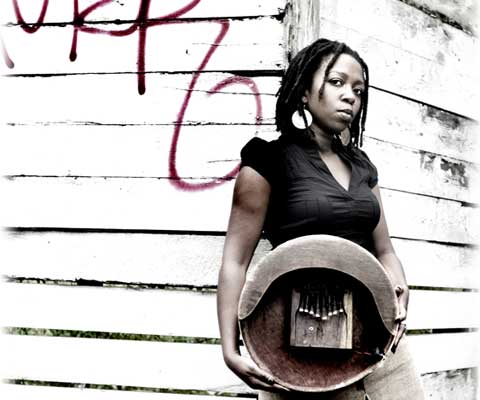 Much like the women who joined the liberation movement, Chiwoniso’s life is a conscious choice and unavoidably there are heavy dues to pay. She knows this and it is partly why she wrote “Rebel Woman.”
Much like the women who joined the liberation movement, Chiwoniso’s life is a conscious choice and unavoidably there are heavy dues to pay. She knows this and it is partly why she wrote “Rebel Woman.”
"The song is about the physical conditions of fighting, and the price people pay," she explains, but it is also a tribute to strong women who suffer because they do not follow the restrictions society tries to place on them. "The truth is that when you're a strong woman you might lose your husband, your home, because the way the systems are structured you're not allowed to be strong as a woman, unless you follow the rules. This is a song about changing those rules." —ChiwonisoNETSAYI
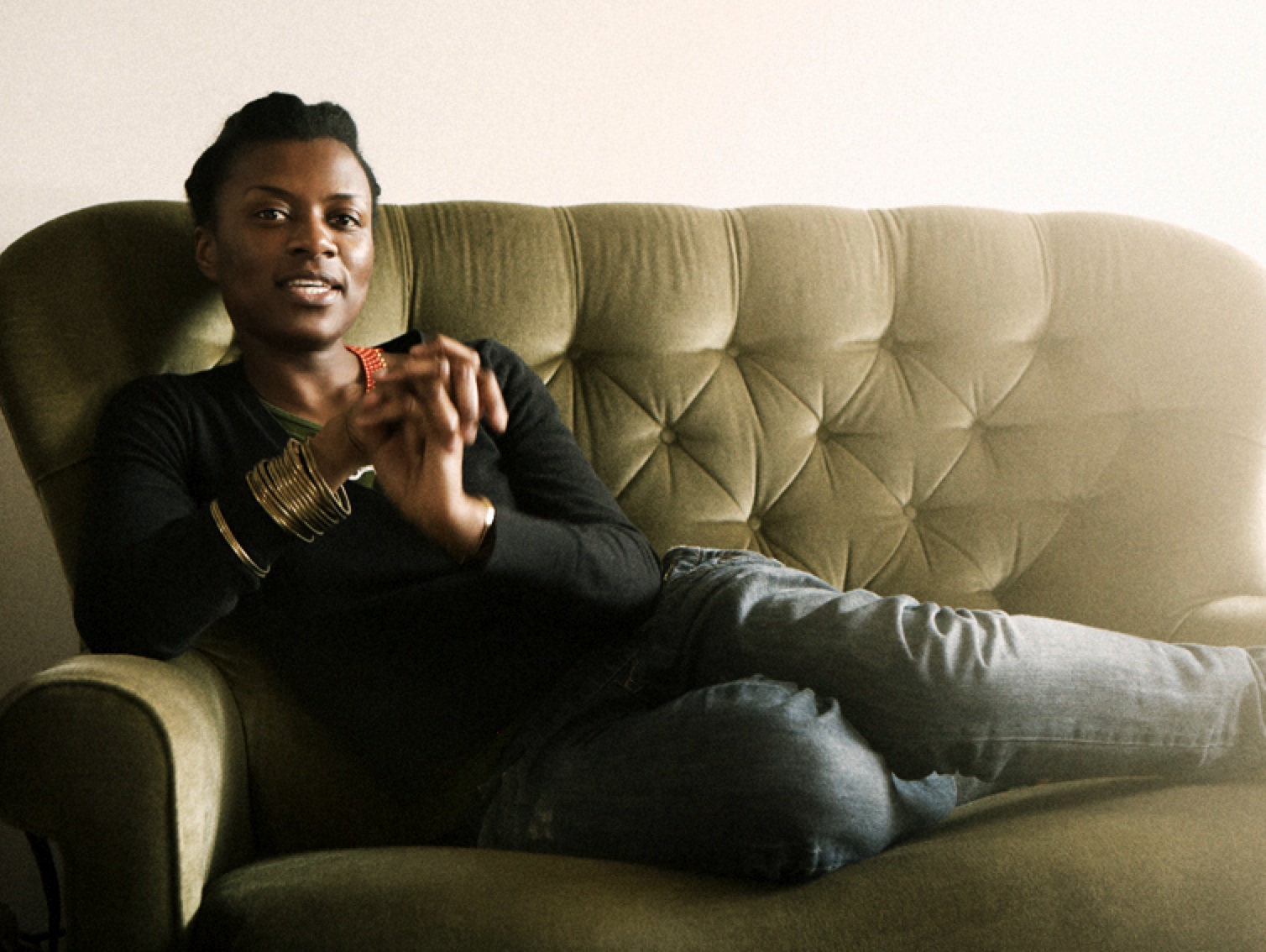 I’ve written glowingly about Netsayi before (go here). I seriously awaited her second release. It is here. While I am not as emotionally moved by Monkey’s Wedding as with her first album, as a fellow artist I am extremely pleased that she is reaching, experimenting, stretching to find her voice, her path.
When you first hear some of this you may even wonder is it African at all? If you have preconceptions of what contemporary African music sounds like, this probably does not fit into that box.
I listened to a couple of her interviews (go here for a video interview) and read as much as I could find. We are not dealing with your average artist trying to be a success in the entertainment industry. Netsayi is on some other ish, and as such she is both a blessing and an inspiration.
A quick word about her music—I am fascinated by how she has taken the traditional mbira music and distributed those easily identified rhythms and melodic patterns across different instruments to create a music that can be African without trademark pounding drums. This is contemporary Zim music that both uses and sometimes doesn't use the mbira but which always retains the mbira flavor.
Netsayi is subtle, and both of course and unfortunately, from an outside perspective subtlety is not a quality usually associated with African music but paradoxically subtlety in its complexity is precisely a regular African trademark, to paraphrase Fela.
I’ve written glowingly about Netsayi before (go here). I seriously awaited her second release. It is here. While I am not as emotionally moved by Monkey’s Wedding as with her first album, as a fellow artist I am extremely pleased that she is reaching, experimenting, stretching to find her voice, her path.
When you first hear some of this you may even wonder is it African at all? If you have preconceptions of what contemporary African music sounds like, this probably does not fit into that box.
I listened to a couple of her interviews (go here for a video interview) and read as much as I could find. We are not dealing with your average artist trying to be a success in the entertainment industry. Netsayi is on some other ish, and as such she is both a blessing and an inspiration.
A quick word about her music—I am fascinated by how she has taken the traditional mbira music and distributed those easily identified rhythms and melodic patterns across different instruments to create a music that can be African without trademark pounding drums. This is contemporary Zim music that both uses and sometimes doesn't use the mbira but which always retains the mbira flavor.
Netsayi is subtle, and both of course and unfortunately, from an outside perspective subtlety is not a quality usually associated with African music but paradoxically subtlety in its complexity is precisely a regular African trademark, to paraphrase Fela.
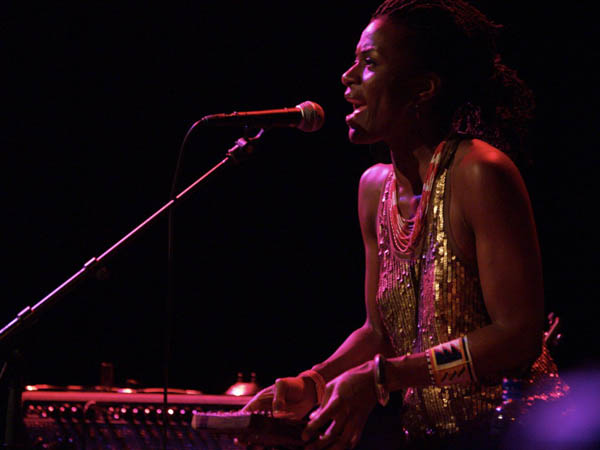 Some of Netsayi’s music is so fierce you ought to be given a background check before listening to it. And some of it is so wistful and gossamer in its sounding that it has the hushed beauty of a breastfed baby contentedly sleeping on its mother’s stomach. Neither character is unique in music, what is unique is that it’s the same artist on the same record offering us one of the widest ranging of musical emotions you might ever want to hear.
Some of Netsayi’s music is so fierce you ought to be given a background check before listening to it. And some of it is so wistful and gossamer in its sounding that it has the hushed beauty of a breastfed baby contentedly sleeping on its mother’s stomach. Neither character is unique in music, what is unique is that it’s the same artist on the same record offering us one of the widest ranging of musical emotions you might ever want to hear.
“Monkey’s Wedding is really an evolution of the thematic and musical ideas, I began to explore on Chimurenga Soul. Musically, it is an album of hybridity - an attempt to process all my musical influences from home and the Western world into coherent and emotionally engaging music. Of course, such an effort has a political angle to it too - African music is appropriated, boxed, labeled and sold in the West. But I hope that Monkey’s Wedding confounds any such easy and frankly colonial classification. Thematically, Monkey’s Wedding treads similar territory, touching on all my experiences as someone who has lived in two very different cultures and, indeed, the no-mans-land between them” —NetsayiOnce again, Netsayi has me eagerly looking forward to her next issue. STELLA CHIWESHE
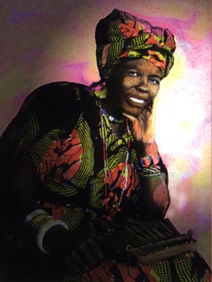 Stella Chiweshe was born November 8, 1946 in Mujumi, Mhondoro, Zimbabwe. When she decided to learn the mibira tradition she had two problems: colonialism and patriarchy. She literally would sneak off into the hills to participate in all night sessions and then return in the morning and proceed with her day as though she had been home sleeping for eight hours.
She faced the opprobrium of many who thought it was both shameful and taboo for a woman to play the mbira and of course the British didn’t want to hear anyone playing the instrument. The Rhodesia colonialists weren’t much better and a fierce liberation struggle ensued, which the liberation forces eventually won and thus Mugabe came to power.
Listening to her music today, one think of it as quaint or proto-typical African in its rhythms and melodies. It is easy to overlook both its revolutionary social context as well as the revolutionary nature of the music itself.
Stella Chiweshe was born November 8, 1946 in Mujumi, Mhondoro, Zimbabwe. When she decided to learn the mibira tradition she had two problems: colonialism and patriarchy. She literally would sneak off into the hills to participate in all night sessions and then return in the morning and proceed with her day as though she had been home sleeping for eight hours.
She faced the opprobrium of many who thought it was both shameful and taboo for a woman to play the mbira and of course the British didn’t want to hear anyone playing the instrument. The Rhodesia colonialists weren’t much better and a fierce liberation struggle ensued, which the liberation forces eventually won and thus Mugabe came to power.
Listening to her music today, one think of it as quaint or proto-typical African in its rhythms and melodies. It is easy to overlook both its revolutionary social context as well as the revolutionary nature of the music itself.
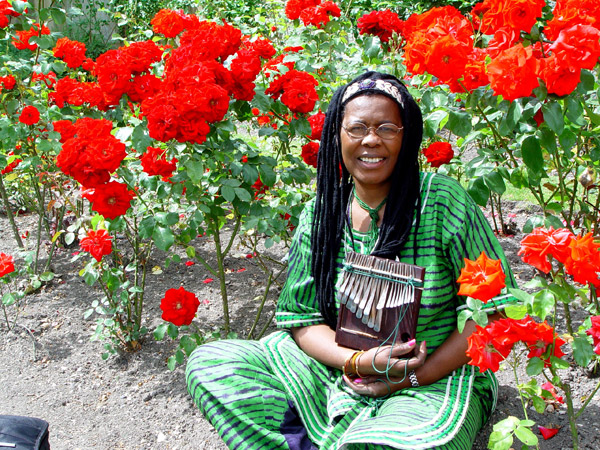 As natural as it may sound today, Stella Chiweshe is credited with being the first person to combine the marimba and the mbira, not to mention she uses two marimbas in interlocking patterns based on the mbira sound, much as her countryman Thomas Mapfumo did using guitars based on mbira patterns.
In African music circles Ms. Chiweshe is affectionately known as “Ambuya Chinyakare” (Grandmother of Traditional Music), a hard earned honorific that is accurate assessment of her place in the development of music in post-colonial Zimbabwe. She is clear about the importance of women in today's world. In fact she thinks women are one of the major healing forces for a troubed planet. In a dream she saw "the soil and the energy of the earth started to sink from a great sadness. Then, from my left came female voices, so beautiful and haunting that the earth stopped sinking."
—Kalamu ya Salaam
Zimbabwe Mbira Mixtape Playlist
As natural as it may sound today, Stella Chiweshe is credited with being the first person to combine the marimba and the mbira, not to mention she uses two marimbas in interlocking patterns based on the mbira sound, much as her countryman Thomas Mapfumo did using guitars based on mbira patterns.
In African music circles Ms. Chiweshe is affectionately known as “Ambuya Chinyakare” (Grandmother of Traditional Music), a hard earned honorific that is accurate assessment of her place in the development of music in post-colonial Zimbabwe. She is clear about the importance of women in today's world. In fact she thinks women are one of the major healing forces for a troubed planet. In a dream she saw "the soil and the energy of the earth started to sink from a great sadness. Then, from my left came female voices, so beautiful and haunting that the earth stopped sinking."
—Kalamu ya Salaam
Zimbabwe Mbira Mixtape Playlist
 The opening track by Chiwoniso is from Women Care, a compilation CD featuring women from Africa and women from Norway. It’s the perfect theme song for this Mixtape.
The opening track by Chiwoniso is from Women Care, a compilation CD featuring women from Africa and women from Norway. It’s the perfect theme song for this Mixtape.
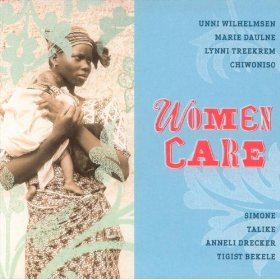 01 “African Women / Femme D'Afrique” - Women Care
01 “African Women / Femme D'Afrique” - Women Care
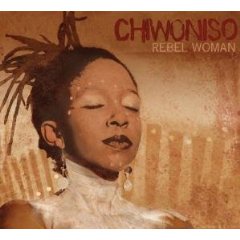 The remaining five Chiwoniso tracks are from her latest release, Rebel Woman.
02 “Matsotsi”
03 “Listen to the Breeze”
04 “Pamuromo”
05 “Only One World”
06 “Rebel woman”
The remaining five Chiwoniso tracks are from her latest release, Rebel Woman.
02 “Matsotsi”
03 “Listen to the Breeze”
04 “Pamuromo”
05 “Only One World”
06 “Rebel woman”
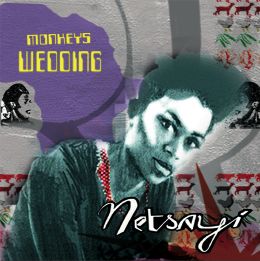 The next six tracks are from Monkey’s Wedding, Netsayi’s new album.
07 “Top Cop”
08 “Teenagers”
09 “Don't Wake Me Up”
10 “Weaves & Magazines”
11 “Money Drum”
12 “Jacaranadas”
The next six tracks are from Monkey’s Wedding, Netsayi’s new album.
07 “Top Cop”
08 “Teenagers”
09 “Don't Wake Me Up”
10 “Weaves & Magazines”
11 “Money Drum”
12 “Jacaranadas”
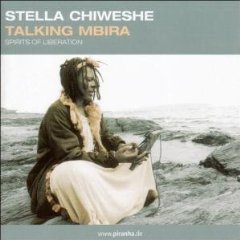 The last three tracks are from Talking Mbira – Spirits of Liberation, a very important album illustrating an approach that is both rootsy and revolutionary in terms of Stella Chiweshe’s approach to creating this awesome Zim music. Note that two of the tracks (#13 & #15) are not only lengthy, they are essentially solo recordings that employ overdubs to create their texture.
The last three tracks are from Talking Mbira – Spirits of Liberation, a very important album illustrating an approach that is both rootsy and revolutionary in terms of Stella Chiweshe’s approach to creating this awesome Zim music. Note that two of the tracks (#13 & #15) are not only lengthy, they are essentially solo recordings that employ overdubs to create their texture.
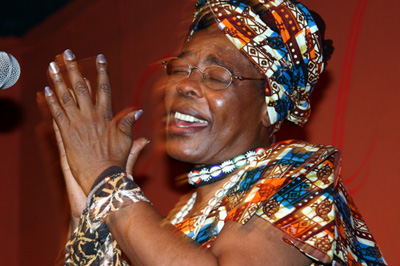 Ms. Chiweshe is devout in her appreciation and commitment to making spiritual music that is based on being trance music. In the traditional setting one song could easily last over an hour or more.
13 “Ndabaiwa [Kassahwa Revisited]”
14 “Chachimurenga [Future Mix]”
15 “Huvhimi [The Vision For Hunters]”
Ms. Chiweshe is devout in her appreciation and commitment to making spiritual music that is based on being trance music. In the traditional setting one song could easily last over an hour or more.
13 “Ndabaiwa [Kassahwa Revisited]”
14 “Chachimurenga [Future Mix]”
15 “Huvhimi [The Vision For Hunters]”
This entry was posted on Monday, January 4th, 2010 at 7:55 am and is filed under Contemporary. You can follow any responses to this entry through the RSS 2.0 feed. You can leave a response, or trackback from your own site.
One Response to “VARIOUS ARTISTS / “Zimbabwe Mbira Music””
January 5th, 2010 at 5:07 pm
Baba, I really enjoyed these selections. Each of the women brought something exciting, moving, and multi-tonal to the jukebox. I liked how their different sensibilities played against each other. Thanks for sharing. A really great collection of music.
Leave a Reply
| top |